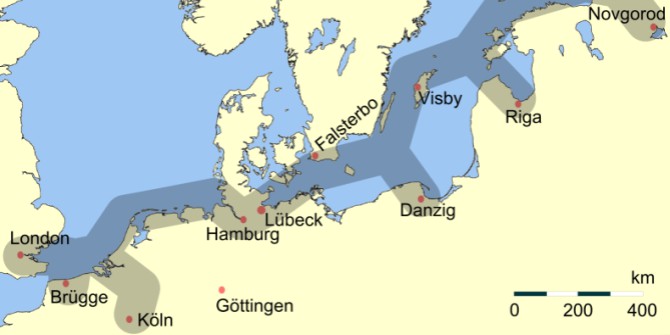The twentieth century witnessed the triumph of democratic capitalism in the industrialised West, with widespread support emerging for free markets and representative elections. Yet in the last two decades, this political consensus has been disrupted by growing inequality, dissatisfaction with democratic institutions, and the rise of populism. Carles Boix examines how these developments and new technological innovations are changing the relationship between capitalism and democracy.
To what extent are capitalism and democracy compatible with each other? And to what degree are today’s changing economy and the growth of inequality threatening the stability and performance of contemporary democracies? These two interrelated questions are the focus of my book, Democratic Capitalism at the Crossroads.
The first question has had a long and rather contested intellectual history. Writing at the peak of the first industrial revolution, intellectuals as diverse as Karl Marx, John Stuart Mill, and the conservative historian Thomas Macaulay coincided in the belief that universal suffrage could not be reconciled with private property and the market economy.
Yet, a hundred years later, democratic capitalism ended up reigning unchallenged in the advanced world, prompting Daniel Bell to conclude in his 1958 book The End of Ideology that “in the Western world, there is today a rough consensus among intellectuals on political issues: the acceptance of the Welfare State; the desirability of decentralized power; a system of mixed economy and of political pluralism.” Then, today, in a new twist that apparently challenges the end-of-history tale that carried the day after the fall of the Soviet Union, a mounting number of voices fret again about populism, democratic backsliding, and even the imminent implosion of representative institutions.
Different capitalisms
Paradoxically, while these theoretical standpoints on the compatibility of capitalism and democracy are at odds with each other, they are all likely to be right or, at least, partially right. My solution to this puzzle is, in a way, simple. Instead of thinking about one capitalism or, as it were, one market economy, we should talk about different capitalisms – each one defined by the nature of its production technologies and organisation, and, above all, by the kind of labour skills that were (and are) complementary to capital. Those varying capital-labour complementarities have a different impact on employment patterns, wages, the distribution of income, and capital’s incentives to invest in public goods. And, as a result, they have a crucial effect on the likelihood of establishing democratic institutions.
In the nineteenth-century capitalism that emerged with the first industrial revolution, most firms employed unskilled labour, resulting in low wages and declining living standards, at least in the new industrial towns. In a context of raising inequality and considerable social tensions, full democracy remained out of the question. The extension of voting rights, when it happened, was circumscribed, at most, to the well-to-do urban classes.
The tensions of Manchesterian capitalism declined with the invention of the assembly line and mass production techniques at the turn of the twentieth century. In what I refer to as Detroit capitalism, semiskilled and skilled individuals replaced unskilled workers as the main type of labour complementary to capital. Fast economic growth, the formation of a broad affluent working class, and the relative equalisation of incomes, which, contrary to well-known theories, did not derive from either war shocks or corporatist institutions but from a technological-driven demand for a more skilled labour force, made universal suffrage possible and, with it, the advent of democratic capitalism.
Technological change
The examination of the historical evolution of capitalism clears the way to discuss the second question I referred to at the beginning of this piece: the nature and consequences of the capitalism of the late twentieth and early twenty-first centuries. The information revolution of the last decades has transformed, once more, the structure of the production process and the economy in general. The demand for professional and managerial jobs has risen steadily.
By contrast, and spreading automation beyond manufacturing plants, the new information and communication technologies (ICTs) have displaced a wide number of traditional white-collar jobs, from accounting and banking to travel agencies. In addition, they have encouraged, in combination with falling transportation costs, an increasing number of companies to unbundle their production operations across the world, moving low-wage jobs to developing countries. Those new employment trends have come hand in hand with a widening distribution of wages and income, particularly in economies that have regulatory structures closer to the American model of flexible labour markets.
All those economic transformations lie behind a process of political realignment. Starting in the 1980s, political satisfaction and trust in government fell as the economy failed to deliver the security it once had. Yet the initial response from political elites was muted and the disaffected simply dropped out of politics. Then, in the early 2000s, fired by the Great Recession, a new brand of political entrepreneurs gained traction, promising to undo globalisation in trade and immigration and, in the process, challenging the political consensus that had prevailed around the principles of democratic capitalism.
The future of politics
The information revolution and the expectations generated by AI have already prompted the publication of multiple accounts, ranging from technologically-driven utopias to the gloomiest of dystopias, about our economic and political future. Yet, despite their diversity, the vast majority share one thing: a lack of analytical clarity in the arguments they develop to forecast the economic and political impact of Silicon Valley capitalism.
For this reason, I set out a roadmap to the future (or, more precisely, possible futures) that unpacks all the assumptions and steps we need to make to understand the effects of ICTs and, more broadly, of AI. First, I discuss the effects of automation on the demand for particular types of labour and on our ability to meet those changes. I then reflect on its impact on the ownership of capital, mostly questioning a rather extended thesis that asserts that robotisation will ineluctably result in the “hyperconcentration” of wealth in a few hands.
Next, I consider the political consequences of the computer revolution. Contrary to some catastrophising claims, I find little support for the idea that it will jeopardise democracy automatically – today’s income level, ten to fifteen times higher than at the beginning of industrialisation, should soften the political impact of automation. Nevertheless, I identify a potential decline in the level of electoral accountability of policymakers and suggest a set of institutional interventions to prevent it.
Finally, I explore a topic that receives very little attention in the literature: the future (not necessarily positive) effects of AI on both newly developed economies and developing countries – the full automation of production may stop or even undo their recent economic growth – and on the evolution of globalisation and transnational migration flows.
For more information, see the author’s accompanying book, Democratic Capitalism at the Crossroads: Technological Change and the Future of Politics (Princeton University Press, 2019)
Note: This article gives the views of the author, not the position of EUROPP – European Politics and Policy or the London School of Economics. Featured image credit: Chase Baker on Unsplash




